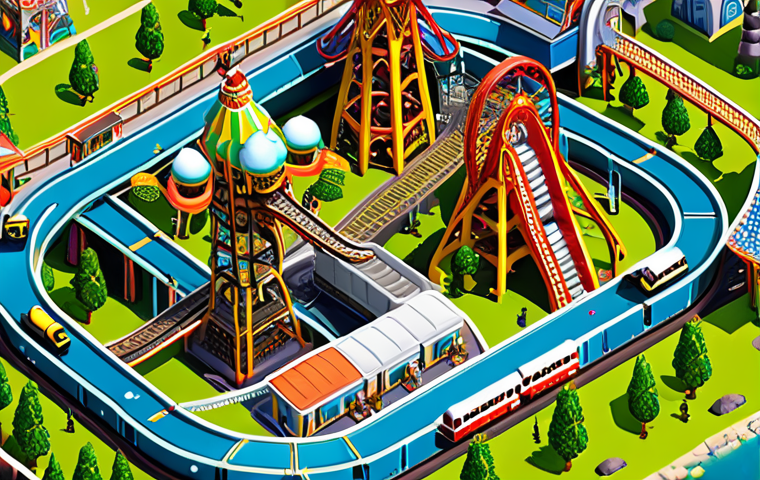There’s just something about classic simulation games that takes you back, isn’t there? I still vividly remember countless sleepless nights spent meticulously planning my cities in *SimCity 2000*, or struggling to keep my virtual theme park from going bankrupt in *RollerCoaster Tycoon*.
These weren’t just games; they were entire worlds we could shape, little sandboxes that ignited our imaginations and, if I’m honest, often tested our patience!
The sheer satisfaction of watching a perfectly optimized production line or a thriving, bustling metropolis you painstakingly built, brick by virtual brick, is an unparalleled feeling that modern gaming, for all its flash and spectacle, sometimes struggles to replicate.
Even with today’s hyper-realistic graphics and complex AI, the enduring appeal of these older gems lies in their fundamental design: offering deep strategic challenges alongside a profound sense of creation and control.
You know, it’s fascinating to see how the spirit of these classics, from resource management to intricate economic models, continues to influence cutting-edge titles and even emerging trends like “cozy games” and complex “tycoon-likes” on Steam.
The demand for engaging, strategic experiences where you can build, manage, and watch your decisions unfold remains incredibly strong. Furthermore, as we look to the future, the core loop of decision-making, optimization, and problem-solving these games perfected is increasingly relevant in real-world applications, from urban planning simulations to supply chain logistics.
They teach you a unique way of thinking, a method of anticipating consequences and celebrating small victories. The deep, lasting impact of these titles on gaming culture, and even how we perceive digital creativity, is undeniable.
We’ll explore it in detail.
The Art of Digital Empire Building

There’s an undeniable allure to crafting something from nothing, watching a sprawling metropolis rise from a barren landscape, or a complex production line humming with efficiency, all thanks to your meticulous planning.
For me, the true magic of classic simulation games like *SimCity* or *Cities: Skylines* (a modern spiritual successor) wasn’t just in the building itself, but in the intricate dance of resource management, population happiness, and economic stability.
I still recall the sheer terror of my first major city-wide power outage in *SimCity 2000*, or the satisfaction of finally turning a profit after countless failed attempts to balance my budget.
It’s more than just placing buildings; it’s about understanding systems, predicting consequences, and reacting to emergent challenges. This deep engagement with systemic thinking is what truly separates these games from mere digital toys.
You become not just a player, but a benevolent (or sometimes tyrannical) deity, shaping destinies with a click of a mouse. The feeling of authorship, of literally designing a world and seeing its inhabitants flourish or flounder based on your choices, is profoundly rewarding and addictive.
It truly teaches you the delicate balance required for large-scale management, whether it’s managing traffic flow, ensuring adequate public services, or even just making sure your citizens have enough parks to relax in.
The iterative process of building, observing, refining, and rebuilding is a core loop that keeps players engaged for hundreds, if not thousands, of hours.
1. Designing Sustainable Urban Landscapes
One of the most captivating aspects of city-building simulations is the constant push and pull between growth and sustainability. I’ve spent countless hours in games like *SimCity 4*, agonizing over zoning decisions, trying to predict where the next traffic jam would appear, or how to best route my water pipes without bankrupting my city.
It’s a surprisingly accurate reflection of real-world urban planning challenges, albeit simplified for entertainment. The moment you finally achieve a positive cash flow with a booming, happy population, crime rates plummeting, and a perfectly laid out public transport system, is a small victory that feels genuinely earned.
This isn’t just about pretty graphics; it’s about the deep satisfaction of solving complex spatial and economic puzzles. You learn to anticipate future needs, to strategically place key infrastructure, and to understand the interconnectedness of various elements within a system.
My personal experience has shown me that true mastery comes not from rapid expansion, but from thoughtful, incremental growth, always keeping an eye on the delicate balance.
2. The Thrill of Micro-Management and Macro-Vision
What sets the best simulation games apart is their ability to blend granular detail with overarching strategic vision. Think about the specific placement of a fire station to cover a certain radius, or the subtle impact of a tax increase on your industrial zones.
Yet, simultaneously, you’re tasked with a macro-vision: designing an entire region, negotiating with neighboring cities, or planning for long-term population growth.
It’s a constant mental juggle that keeps you on your toes. I remember the frustration of seeing my carefully crafted residential areas become blighted because I neglected proper waste management, or the joy of seeing a new high-tech industry flourish after years of nurturing my education system.
This dual focus on both the tiny details and the grand scheme of things is not only engaging but also incredibly educational. It trains your brain to think systematically and holistically, skills that are surprisingly applicable in various real-world scenarios.
Mastering the Micro-Economies: Tycoon Games and Beyond
Beyond the grand scale of city-building, the simulation genre truly shines in its ability to let you dive deep into specific industries, transforming a nascent venture into a sprawling empire.
Tycoon games, in particular, hold a special place in my heart. From the chaotic but utterly charming theme park management in *RollerCoaster Tycoon* to the intricate supply chains of *Transport Tycoon Deluxe*, these games force you to confront the often-brutal realities of economics, logistics, and customer satisfaction.
I’ve personally experienced the agony of a failing theme park due to poorly placed food stalls, or the elation of finally establishing a highly profitable railway network across an entire continent.
These aren’t just games where you build; they’re games where you *optimize*, where every decision, from pricing tickets to routing trains, has a tangible impact on your bottom line.
It’s a constant cycle of experimentation, failure, and eventual triumph. The level of detail in these economic simulations is truly impressive, often reflecting real-world market dynamics in surprisingly nuanced ways.
You quickly learn that profits aren’t just about making money; they’re about efficiency, customer perception, and smart investment.
1. The Customer is Always Right (or at Least, Always Complaining!)
In games like *Theme Hospital* or *RollerCoaster Tycoon*, the direct interaction, or rather, reaction, of your customers is central to success. I vividly remember the little thought bubbles above my park visitors’ heads, indicating their delight with a new ride or their extreme displeasure with dirty pathways and overpriced drinks.
Managing these virtual patrons, keeping them happy, and extracting every last penny from their pockets, becomes a surprisingly complex challenge. It’s not enough to just build attractions; you need to manage queues, provide amenities, ensure cleanliness, and even deal with their occasional bouts of vomiting!
This constant feedback loop trains you to be incredibly responsive and detail-oriented. My strategy always involved an obsessive focus on guest flow and facility placement, realizing early on that a happy customer would spend more and stay longer.
This human-centric approach, even in a simulated environment, is a core lesson in business acumen.
2. Supply Chains and Strategic Logistics
For me, the true intellectual challenge of tycoon games often lies in their sophisticated logistical puzzles. Games like *Factorio* (though more modern, it embodies this spirit) or even the older *Railroad Tycoon* series require a deep understanding of supply and demand, transportation networks, and efficient resource allocation.
I’ve spent countless hours in *OpenTTD*, a brilliant open-source remake of *Transport Tycoon Deluxe*, meticulously laying tracks, designing complex signaling systems, and optimizing routes to ensure my goods reached their destination profitably.
The satisfaction of seeing a perfectly synchronized network of trains, trucks, and ships ferrying goods across your map, generating massive income, is truly unparalleled.
It’s a masterclass in operational efficiency, teaching you about bottlenecks, throughput, and the critical importance of infrastructure planning. My personal takeaway from these experiences is that an optimized flow is often more valuable than raw output.
Beyond Pixels: The Real-World Lessons Taught by Virtual Worlds
It might sound a bit grand, but I truly believe that playing classic simulation games instills a unique set of skills that transcend the digital realm.
I’ve found that the iterative problem-solving, the systemic thinking, and the patient optimization required in these games translate remarkably well into real-life situations, from project management to financial planning.
These games aren’t just about entertainment; they’re often unacknowledged training grounds for critical thinking and strategic foresight. For example, my time managing a virtual city’s budget taught me more about balancing expenditures and revenues than any textbook ever could.
The constant feedback loop within the games, where your decisions immediately yield visible consequences, accelerates the learning process in a way that passive learning simply cannot replicate.
They push you to anticipate future problems, to experiment with solutions, and to understand the interconnectedness of various components within any system, be it a city, a business, or even your own personal finances.
1. Developing Problem-Solving and Strategic Thinking
One of the most valuable takeaways from my years immersed in simulation games is the honed ability to break down complex problems into manageable parts.
When your virtual city grinds to a halt due to traffic congestion, you don’t just throw up your hands; you systematically identify the bottlenecks, experiment with new road layouts, and implement solutions, often iteratively.
This same methodical approach can be applied to almost any real-world challenge, from optimizing your daily commute to planning a complex work project.
I’ve also learned the importance of strategic foresight – thinking several steps ahead, anticipating potential issues before they escalate. It’s about not just reacting to problems but proactively designing systems that mitigate them.
2. Understanding Systems and Interdependencies
These games are essentially interactive models of complex systems. Whether it’s the delicate balance of an ecosystem in *Theme Park* or the intricate supply chain of a factory in *Factorio*, you quickly grasp that everything is interconnected.
Pull one lever, and something else will inevitably shift. This understanding of systemic interdependencies is, in my opinion, an invaluable life skill.
It helps you see the bigger picture, to understand how different departments in a company rely on each other, or how political decisions can have ripple effects across society.
I remember the immediate gratification of fixing a public health crisis in *SimHospital* by not just curing patients, but by improving sanitation and training staff, understanding that a holistic approach was necessary.
This insight into how systems function, and how to influence them, is a profound lesson that these games impart subtly.
The Enduring Charm of Nostalgia: Why We Keep Coming Back
It’s fascinating, isn’t it, how certain games from our past continue to exert such a powerful pull? For many of us, classic simulation games are more than just old titles; they’re digital time capsules that transport us back to simpler times, evoking a profound sense of nostalgia.
I often find myself re-installing *Zoo Tycoon* or *RollerCoaster Tycoon 2* not just to play them, but to revisit the feeling of childlike wonder and boundless creativity they once inspired.
There’s a certain comfort in their predictable mechanics and familiar interfaces, a digital “cozy blanket” that we can wrap ourselves in after a long day.
This isn’t just about pixelated graphics; it’s about the unique blend of challenge and comfort that these games offer, a space where you can be both the architect and the player, fully in control of your miniature world.
The enduring appeal lies not just in their mechanics, but in the memories and emotions they carry.
1. The Comfort of Familiar Mechanics and Simplicity
In an age of increasingly complex, photorealistic, and often overwhelming games, there’s something incredibly refreshing about revisiting the elegant simplicity of classic simulations.
They often had intuitive interfaces and clear objectives, allowing you to dive straight into the creative process without hours of tutorials. I particularly appreciate how they often prioritized gameplay depth over graphical fidelity, leading to experiences that are still engaging decades later.
This isn’t to say modern games are bad, but there’s a certain unburdened joy in firing up a game where you immediately understand the core loop and can just *play*.
It’s a comfort food of gaming, offering a reliable and satisfying experience that doesn’t demand too much mental overhead, yet still provides ample strategic depth.
2. Replaying Memories: A Digital Time Machine
For me, revisiting these old games is akin to looking through an old photo album. Each scenario, each map, each meticulously placed building brings back a flood of memories: sleepless nights, triumphs over virtual disasters, and shared experiences with friends and family.
It’s a personal journey through my own gaming history. I remember the sheer excitement of building my first successful monorail in *RollerCoaster Tycoon* or the intense focus required to finally get a profit out of my virtual theme park.
These moments are etched into my memory, and replaying the games allows me to re-experience those feelings. The nostalgia isn’t just for the games themselves, but for the person I was when I first played them, and the joy they brought into my life.
It’s a powerful connection that keeps me, and countless others, coming back.
The Evolution of Simulation: From DOS to Modern Masterpieces
It’s truly remarkable to observe how the simulation genre has evolved over the decades, transitioning from humble beginnings on platforms like DOS to the sprawling, highly detailed experiences we see today.
While the core tenets of building, managing, and optimizing remain, the technological advancements have opened up incredible new possibilities. I’ve witnessed this transformation firsthand, from the blocky pixels of early *SimCity* to the breathtaking vistas and intricate traffic simulations of *Cities: Skylines*.
This isn’t just about better graphics; it’s about more complex AI, larger maps, more realistic physics, and the ability to simulate ever more granular details.
Despite these massive leaps, the underlying design philosophy – giving players the tools to create and manage their own worlds – has remained wonderfully consistent.
It’s a testament to the timeless appeal of the genre’s fundamental principles.
1. Technological Leaps and Creative Boundaries
The progress in computing power has fundamentally reshaped what’s possible within simulation games. Think about the limitations faced by early developers trying to simulate an entire city with rudimentary processors and limited memory.
Today, we have games that can simulate individual citizens, complex weather patterns, and intricate economic systems with astounding fidelity. This allows for a deeper, more immersive level of play.
I remember playing *Transport Tycoon* and being amazed by its simple but effective economic model; now, games like *Factorio* offer factory automation on an industrial scale with mind-boggling complexity.
These advancements haven’t just improved graphics; they’ve allowed designers to push the boundaries of what can be simulated, leading to richer, more challenging, and ultimately more rewarding experiences.
2. The Influence of Indie Developers and Community Creations
While AAA studios have pushed graphical boundaries, the indie scene and passionate modding communities have truly kept the spirit of classic simulation alive and thriving.
Titles like *RimWorld*, *Stardew Valley*, or *Factorio* might not have the massive budgets of a *SimCity* successor, but they embody the same deep strategic elements, player freedom, and obsessive detail that we cherish in the classics.
I’ve found immense joy in exploring these indie gems, often discovering innovative mechanics and fresh takes on familiar concepts. The modding community, in particular, has extended the life of countless games, adding new content, improving features, and sometimes even completely overhauling the base game.
This grassroots creativity is a vital part of the simulation genre’s ongoing evolution, demonstrating that the passion for building and managing virtual worlds runs deep.
| Aspect | Classic Simulation Games (e.g., SimCity 2000, RCT) | Modern Simulation Games (e.g., Cities: Skylines, Factorio) |
|---|---|---|
| Graphics & Visuals | Often pixel-art, 2D isometric, charming but less realistic. Focused on clarity. | Highly detailed 3D, realistic textures, dynamic lighting. Immersive. |
| Complexity & Depth | Deep mechanics, but sometimes abstracted. Challenges derived from resource limits. | Enormously complex, often simulating individual agents, complex physics, and vast systems. |
| User Interface | Menu-driven, often with icon-based controls. Intuitive for their time. | More dynamic, often context-sensitive. Can be overwhelming due to feature creep. |
| Modding & Community | Active modding, fan-made tools, and community forums extended longevity. | Extensive official modding support (e.g., Steam Workshop), large, vibrant communities. |
| Learning Curve | Accessible to pick up, deeper challenges revealed over time. | Can be steep due to sheer volume of features and intricate systems. |
| Emotional Connection | Strong nostalgic appeal, feeling of pure creation and mastery. | Focus on realism, optimization, and often intense problem-solving. |
Crafting Your Own Narrative: The Player’s Role in Simulation
What truly sets simulation games apart, in my experience, is their unparalleled ability to empower the player to create their own unique stories. Unlike linear narratives found in many other genres, simulation games offer an open-ended canvas where the narrative emerges directly from your decisions, successes, and spectacular failures.
There’s no pre-determined plot; instead, you’re the author of your city’s rise and fall, your theme park’s triumphs and bankruptcies, or your factory’s intricate, humming efficiency.
I recall countless times where unexpected events – a natural disaster, a sudden economic downturn, or a hilarious guest meltdown – would completely alter my strategy and create a memorable “story” that was uniquely mine.
This sense of personal authorship fosters a deeper connection with the game world and ensures that every playthrough feels fresh and distinct. It’s truly a sandbox for emergent storytelling.
1. The Unscripted Drama of Emergent Gameplay
The magic often happens when the game’s various systems collide in unpredictable ways, leading to moments of unscripted drama or humor. I remember the sheer panic of an unexpected tornado tearing through my perfectly planned *SimCity* metropolis, forcing me to shift from long-term planning to immediate crisis management.
Or the hilarity of watching my virtual park visitors in *RollerCoaster Tycoon* getting sick after a particularly intense ride, leading to a frantic cleanup effort.
These aren’t pre-programmed cutscenes; they’re direct consequences of the simulated world reacting to your input and random chance. This emergent quality makes every session feel like a unique adventure, filled with unexpected challenges and delightful surprises that you simply can’t get from a fixed narrative.
It’s these unpredictable moments that stick with me long after I’ve stopped playing.
2. From Designer to Storyteller: Personalizing Your World
Beyond the systemic reactions, the true storytelling comes from the personal narratives we construct around our creations. I’ve named individual shops in *Theme Hospital*, imagined the lives of my virtual citizens in *SimCity*, and even crafted backstories for the quirky rides in my *RollerCoaster Tycoon* parks.
These personal touches, however small, transform a collection of pixels and code into a vibrant, living world. It’s about investing emotionally in the outcome, cheering for your successes, and lamenting your failures as if they were your own.
This deep level of personal investment, fostered by the open-ended nature of the genre, turns every playthrough into a unique saga written by your own hand.
The freedom to shape, influence, and narrate your world is arguably the simulation genre’s most profound and enduring appeal.
The Future is Simulated: VR, AI, and What’s Next
Looking ahead, the simulation genre is poised for even more incredible advancements, driven by emerging technologies like virtual reality, increasingly sophisticated AI, and even real-time data integration.
It’s a truly exciting time to be a fan, as the line between what’s simulated and what’s real continues to blur. I’ve always imagined what it would be like to walk through my *SimCity* creations in VR, or to interact directly with my park guests in a truly immersive way.
These aren’t just pipe dreams anymore; they’re becoming tangible possibilities. The core appeal of managing complex systems remains, but the tools and the fidelity with which we can engage with these systems are growing exponentially.
The genre is not just surviving; it’s thriving and adapting, promising even deeper levels of immersion and strategic depth for years to come.
1. Immersive Realities: Simulation in VR/AR
Imagine stepping into your painstakingly built city from *Cities: Skylines*, walking among your citizens, or riding your own roller coasters in first-person with a VR headset.
This level of immersion is rapidly becoming a reality, offering an unprecedented sense of presence and scale. I’ve tried a few early VR simulation experiences, and while they’re still in their nascent stages, the potential is absolutely mind-blowing.
It’s no longer just about managing abstract systems from a top-down view; it’s about being *inside* your creation, directly observing its successes and failures from a human perspective.
This shift promises to deepen the emotional connection players have with their virtual worlds, making the stakes feel even more tangible and immediate.
2. AI-Driven Worlds and Dynamic Challenges
The future of simulation will undoubtedly see more sophisticated AI driving the virtual inhabitants and emergent events, leading to even more dynamic and unpredictable gameplay.
Imagine citizens in *SimCity* who develop their own routines, preferences, and even social dynamics, reacting to your decisions in more nuanced ways. Or theme park guests with highly individual personalities, making every visit a truly unique challenge.
This level of AI sophistication will move beyond simple scripts, creating living, breathing worlds that feel truly autonomous. I’m excited to see how this evolves, as it promises to create challenges that are less about optimization and more about adaptation to truly intelligent, responsive systems, further enhancing the replayability and depth of these beloved games.
Wrapping It Up
My journey through the pixelated realms of classic simulation games has been nothing short of transformative. From the painstaking planning of cities to the intricate logistics of a rail empire, these games have offered far more than just entertainment; they’ve been profound teachers, honing my strategic thinking, problem-solving skills, and understanding of complex systems.
As we look to the horizon, with VR and advanced AI promising even more immersive and dynamic worlds, the future of simulation gaming is incredibly bright.
The enduring charm of these titles, whether modern masterpieces or nostalgic classics, lies in their unique ability to empower us, the players, to become architects, economists, and storytellers in our own right.
Useful Resources & Tips
1. Rediscover the Classics: Many older simulation games are available on digital storefronts like GOG.com (Good Old Games), often updated to run smoothly on modern operating systems. It’s a great way to revisit your childhood favorites without compatibility headaches.
2. Join the Community: Websites like Reddit (e.g., r/SimCity, r/CitiesSkylines, r/Factorio) and dedicated forums for specific games are goldmines for tips, strategies, and even finding multiplayer sessions. The community engagement is a huge part of the fun.
3. Explore Modding: For many simulation games, especially PC titles, modding communities offer an incredible wealth of user-created content. From new buildings and vehicles to complete gameplay overhauls, mods can significantly extend the life and depth of a game.
4. Watch Let’s Plays & Tutorials: If you’re new to a complex simulation game or just want to pick up some advanced strategies, YouTube channels dedicated to gaming often feature extensive “Let’s Play” series or in-depth tutorials that can accelerate your learning.
5. Start Simple, Then Expand: When diving into a new simulation game, especially a complex one, don’t try to build the perfect empire from day one. Start with basic mechanics, understand the core loops, and then gradually expand your ambitions. Patience is key to mastering these virtual worlds.
Key Takeaways
Classic simulation games offer a unique blend of entertainment and skill development. They excel in teaching systemic thinking, iterative problem-solving, and the delicate balance of resource management, all while fostering a deep sense of personal authorship.
The genre’s human-like appeal comes from its ability to generate emergent narratives and allow players to shape their own unique worlds, offering timeless lessons applicable far beyond the digital screen.
With technological advancements, the future promises even more immersive and dynamically challenging experiences, ensuring the enduring relevance and continued evolution of this beloved gaming niche.
Frequently Asked Questions (FAQ) 📖
Q: Why do you think these older simulation games still resonate so much with players, even with all the flashy new titles out there?
A: Oh man, that’s a question I’ve chewed on a lot myself. Honestly, I think it boils down to something really fundamental about human nature: the pure, unadulterated joy of creation and control.
You know, back then, games like SimCity 2000 or RollerCoaster Tycoon weren’t just about winning; they were these incredible digital canvases. I remember spending hours just trying to get my city’s traffic flow just right or figuring out the perfect path for a coaster that wouldn’t make all my guests instantly sick.
It was deeply personal. Modern games, for all their incredible graphics and complex narratives, sometimes hold your hand a bit much, or they’re more about experiencing someone else’s story.
With the classics, you were the architect, the mayor, the god. That sense of direct impact, watching your decisions, big or small, manifest right before your eyes – that’s a high that’s truly hard to beat.
It’s a feeling of tangible accomplishment, even if it’s all virtual, and I think that’s why we keep coming back.
Q: How do you see the influence of these classic simulation games playing out in today’s gaming landscape, especially with new genres emerging?
A: It’s actually pretty wild to see, isn’t it? The DNA of those old-school sims is everywhere if you look closely. Think about it: that core loop of resource management, optimization, and problem-solving they perfected?
That’s the backbone of so many indie darlings and even AAA titles today. I mean, look at the rise of “cozy games” on Steam, like Animal Crossing or Stardew Valley – they tap into that same desire for creation and a sense of calm control, albeit with a gentler pace.
Or the sheer number of “tycoon-likes” and city-builders that flood the market, from Cities: Skylines to even colony management games like RimWorld. They’re all building on those foundational ideas: giving players deep systems to tinker with, economies to balance, and a world to shape.
It’s not just about graphics; it’s about the deep, satisfying mechanics. Developers just keep finding new ways to iterate on that brilliant core concept, and honestly, that’s exciting to watch.
It proves that good design principles never really go out of style.
Q: Beyond just playing, do you think there’s any real-world value or skill-building that comes from diving deep into these kinds of simulation games?
A: Absolutely, no question about it. I genuinely believe these games, at their best, are incredible training grounds for a certain kind of analytical thinking.
When you’re trying to figure out why your SimCity citizens are complaining about commute times, or why your Theme Park rides aren’t profitable, you’re essentially doing a stripped-down version of real-world problem-solving.
You’re analyzing data (even if it’s just little thought bubbles!), identifying bottlenecks, forecasting consequences, and then making decisions to mitigate issues.
I’ve found myself unconsciously applying lessons learned from optimizing a virtual factory to, say, organizing my actual home office or even thinking through a work project flow.
It teaches you to see interconnected systems, to anticipate ripple effects, and to value efficiency. It’s a low-stakes environment to practice critical thinking, resource allocation, and even a bit of resilience when things inevitably go wrong.
So yeah, it’s not just “playing”; it’s a unique, often fun, way to sharpen your strategic mind. You learn to celebrate those small, hard-won victories, and that translates.
📚 References
Wikipedia Encyclopedia
구글 검색 결과
구글 검색 결과
구글 검색 결과
구글 검색 결과
구글 검색 결과



